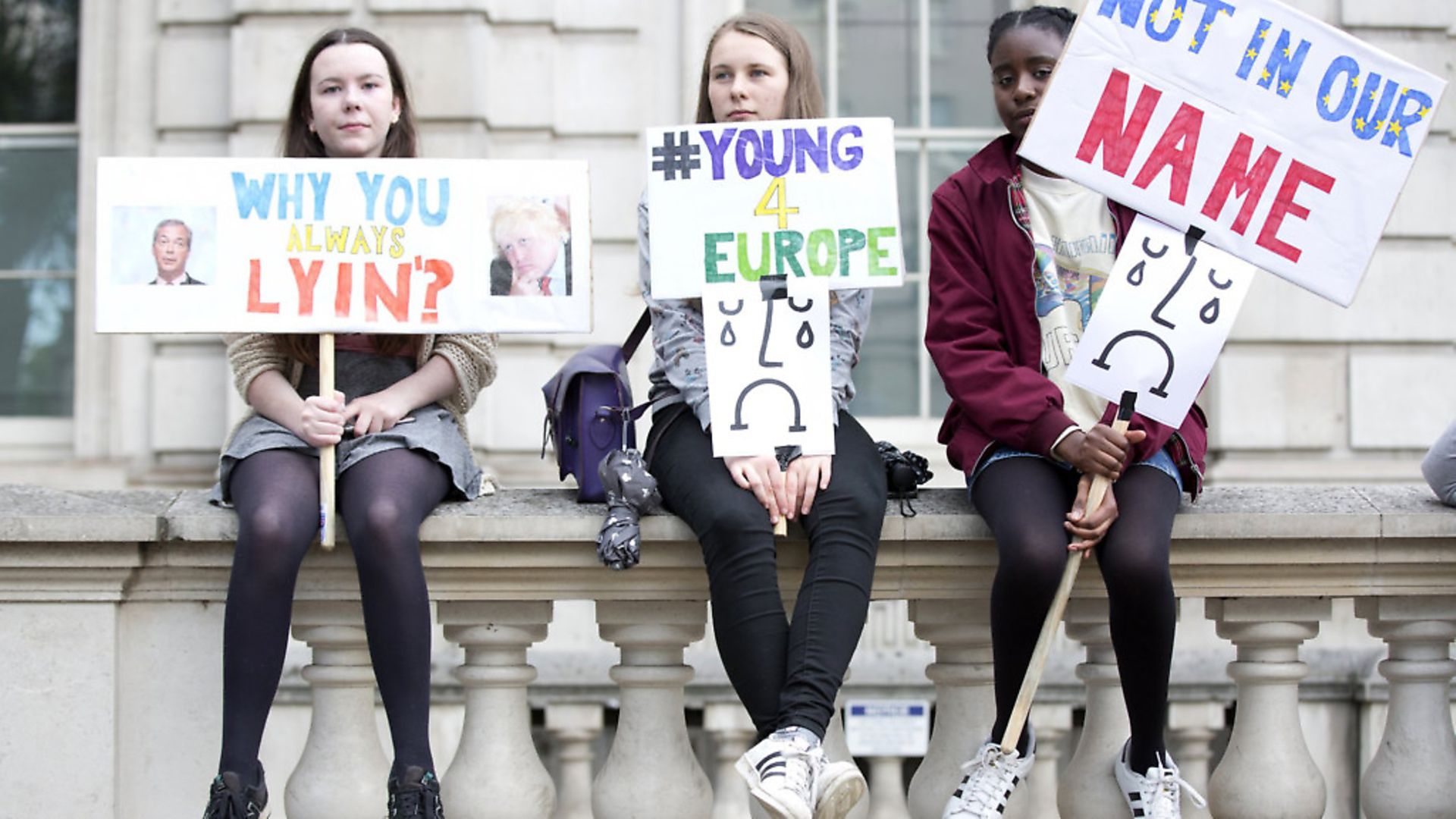
The election taught us the importance of nuance which was missing amid the misplaced certainties of last year’s referendum. Now, we desperately need to hang on to it
There is a hard core of commentators – ok, one or two – so wedded to a conservative victory that they still insist it happened. Most, however, concede that Jeremy Corbyn did much better than anyone imagined…. I was going to leave that there for modesty, but sod it: I did imagine it.
I knew a progressive alliance, or anti-Tory alliance, was happening on the ground, and I knew that something would come of it. Back in May, a colleague put his hands to his temples, cast his eyes to the ceiling as if beseeching the gods for patience, and said: ‘There’s going to be a Tory landslide, unless the unicorns ride in to save us.’ I’m just laying out terms – every time I say, ‘unexpected’, I mean, ‘by other people’. Anyway, many reasons, all of them valid, have been given for the unforeseen results: a great campaign by Labour, leading to a high youth turn-out, especially in university towns; and a woeful campaign by the Conservatives, leading the nation to finally find its gag reflex.
Brexit naturally features in these analyses, but so far in typically binary and unfalsifiable ways; the result was either a rejection of Hard Brexit (the broad progressive view) or an endorsement of Brexit generally (the Conservative view, marshalling results like Richmond Park, in which the freak anti-Brexit Lib Dem victory in the by-election was narrowly overturned).
The true picture is more complicated: I had never heard the phrase ‘strategic ambiguity’ until this election, and now I find myself using it all the time. Labour’s position on Brexit was ambiguous – I was never close enough to the campaign to know whether or not this was strategic, but it worked out too well for them to write off the possibility. Broadly, their framing and rhetoric allowed people in Leave areas to believe they meant Leave, while people in Remain areas believed they would, at the very least, oppose the Tories’ belligerent stance. The vagueness is especially salient in the youth vote: there is an astonishing graph of voting by age, in which the proportion of voters for Remain / Labour track each other precisely among the young, while the same is true for Leave / Conservative among the old.
The hive mind decided, effectively, that voting for a blank Remain – turn back the clocks, start again – would have meant voting Lib Dem, and wouldn’t work. Meanwhile, a vote for Labour would at least be a vote for the values of openness, modernity and international cooperation and cross-pollination that Remain holds dear.
As for those Leavers who voted Labour anyway, they tended to the view – so far this is anecdotal, from reporters on the ground – that Brexit was a done deal which didn’t need to inform their decision, leaving them free to choose a party on other grounds, like the NHS and social care.
May’s ‘strong and stable’ mantra backfired spectacularly, in any case: it was tacitly underpinned by the idea that we were entering very choppy waters, and needed to uphold the status quo above all. Yet the Brexit narrative was very gung-ho, typified by Boris Johnson’s asinine assertions that everything was going perfectly well in the best of all possible worlds. It turns out that people will believe what a government says, for a period, unless they’re predisposed not to: but what they won’t do is believe both what a government says (Brexit is brilliant) and what a government implies (Brexit is very risky) when those things contradict one another.
UKIP voters, meanwhile, rebutted the assumption that their votes would automatically migrate to May, once UKIP were seen as a busted flush. Some voted Conservative, some stayed at home, some went Labour. However mixed the picture, it was enough to hold a lot of Labour seats, particularly in Wales and the North East, which the Conservatives had thought were in the bag. In hindsight, this is all pretty obvious: what isn’t obvious is how Labour managed to walk that tightrope – to be seen as ready to enact Brexit, while recognising the depths of its complication and jeopardy – without taking a hit to its support.
It is partly the clear conflict within Corbyn himself. A man seemingly incapable of telling a lie, and certainly incapable of that assured political dissemblance, answering and not answering, committing yet evading, he was always, plainly, vexed on the EU, never more than a ‘seven out of 10’ (at a push, as he memorably corrected, ‘a seven and a half’).
This did for him in the referendum itself and enraged many Remainers, myself included, with its painful inadequacy, in the face of the Leave side’s trenchant certainty. Yet things have changed: as the picture has unfolded, we’ve all realised that certainties were unfounded and misplaced, that a bit of nuance was essential but missing in the original debate, and remains vital in the execution of its result. Politicians have to be able to recognise the faults inherent in any gigantic set of institutions, while celebrating the cooperation they foster when they work. What could be more reasonable? It is only a shame that it took the cartoonish intransigence of the Hard Brexit Conservatives, each fresh complexity eliciting more of their bullish simplicity, before the benefits of a subtler view could be appreciated.
Paradoxically, the divisions within the party, held by received wisdom to be the death of any electoral prospects, helped as well. Those within Labour who were implacably opposed to Corbyn’s leadership kept pretty quiet on the large issues.
But there was a large element of the PLP who were broadly on the ‘left’ of the party but managed to make their own distinct points. Keir Starmer, while he supported Corbyn and had his support, nevertheless carved out a discrete place for himself: he was an authentic, unapologetic Remainer but was ready to enact Brexit; and he had a positive vision.
He wasn’t asking ‘Hard or Soft?’, but ‘how do we get a better Brexit?’ Can we think bigger than protecting worker and environmental rights? Can we expand and strengthen them? Can we look beyond panicky trade and tariff deals, and ask how to support our own industries while cooperating with others? Can we have a constructive conversation with one another about immigration numbers, workers talking to employers, universities talking to local authorities, devolved, respectful, generative debates that are a bit more sophisticated than a cat fight between ‘none’ and ‘all’?
Clive Lewis, meanwhile, had set out his stall by voting against triggering Article 50 – which, by the way, was the right thing to do. It was an act of the most appalling hubris to trigger a time-limited, nation-changing process and then call a general election. Lewis managed, in a way that embodies the new politics and wouldn’t have been possible when loyalty was an MP’s only quality, to give voice to what must still be a significant element of the Labour party.
The MPs who will not, in conscience, cast a vote that they know to be against the national interest; those who are pro-business yet simultaneously pro-society, and will not swallow any narrative which relies on one against the other. Taken altogether – with Emily Thornberry and her often over-looked career in human rights law – the Labour team provided more than just nuance and pluralism. They managed, in their disagreements as much as in their moments of unity, to look like plausible people with expertise, patriotism, courage, intelligence and humility, which threw the Conservative Brexit team into the most dramatic relief.
Obviously, the question now is how to turn that strategic ambiguity into meaningful opposition to May’s government, constructive participation in the Brexit talks and consolidated support from voters come the next election.
There are so many variables it’s like playing a game of chess in which all the pieces might at any time decide to move on their own; and, also, are cats. We do not know how long May will last as leader, nor how long the party will last with its ramshackle ‘confidence and supply’ deal. We do not know how serious a threat is posed to the ‘governing’ party by its own high-profile Remain wing, featuring its only extant former prime ministers. It is important for Labour not to get mired in its own stance on the single market – John McDonnell seems ready to scotch it before many other members of the party, but fighting to unify is less of a priority than allowing detailed and open debate about a complicated question. Pluralism has never been more important. Nobody voted in the referendum with any clear idea of what would happen to the single market or the customs union. To allow their destruction on rhetorical grounds would be an unforced error.
Labour should push a few principles, which would align with the election they just fought: the Conservatives have neither the mandate nor the talent to negotiate this alone; the country has never voted to make itself permanently poorer, and mature, actionable parliamentary debates must be held on every fundamental; anyone barking ‘Brexit means Brexit’ while serious people are trying to pick their way through serious territory should be ashamed of themselves.










